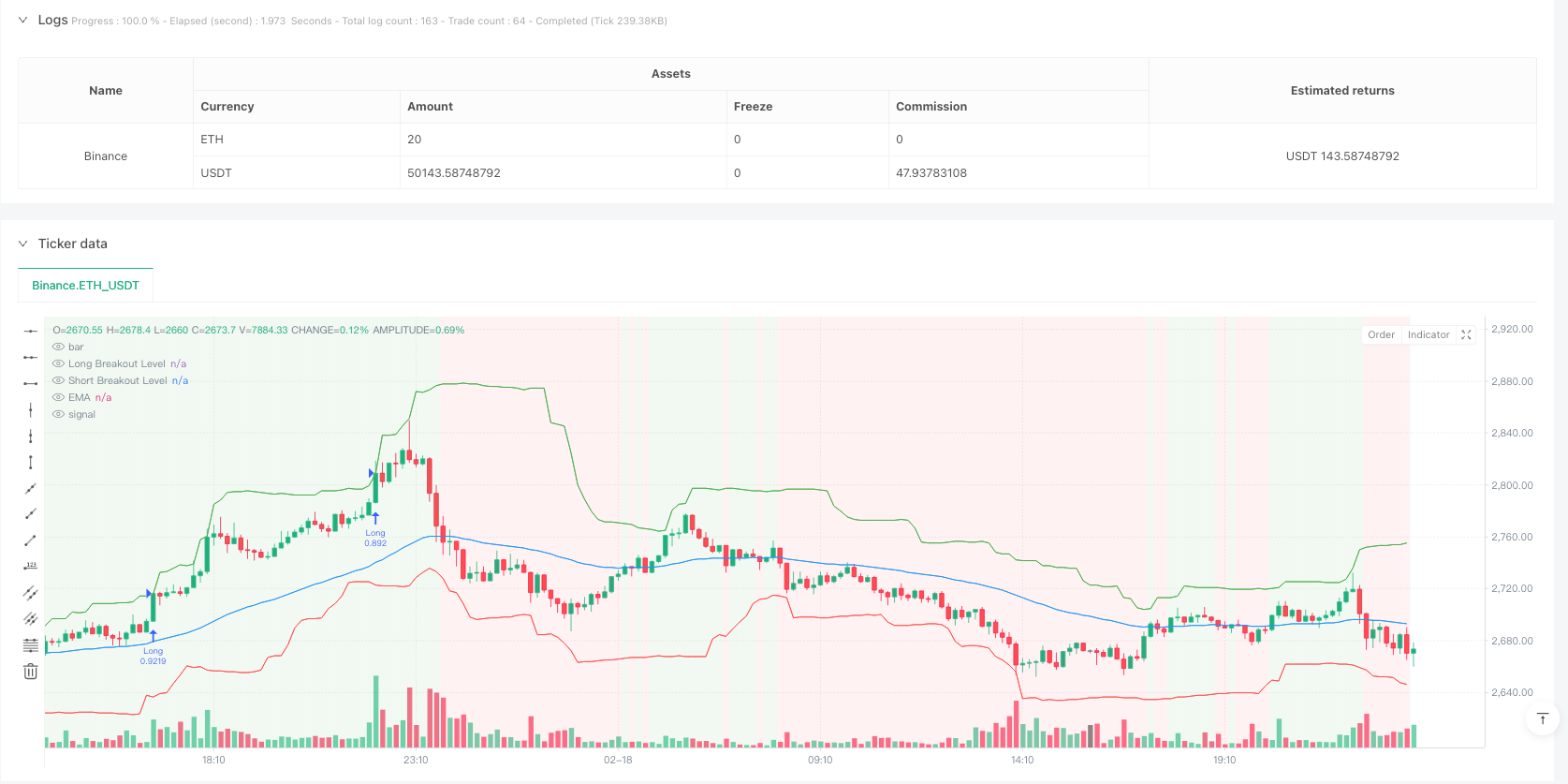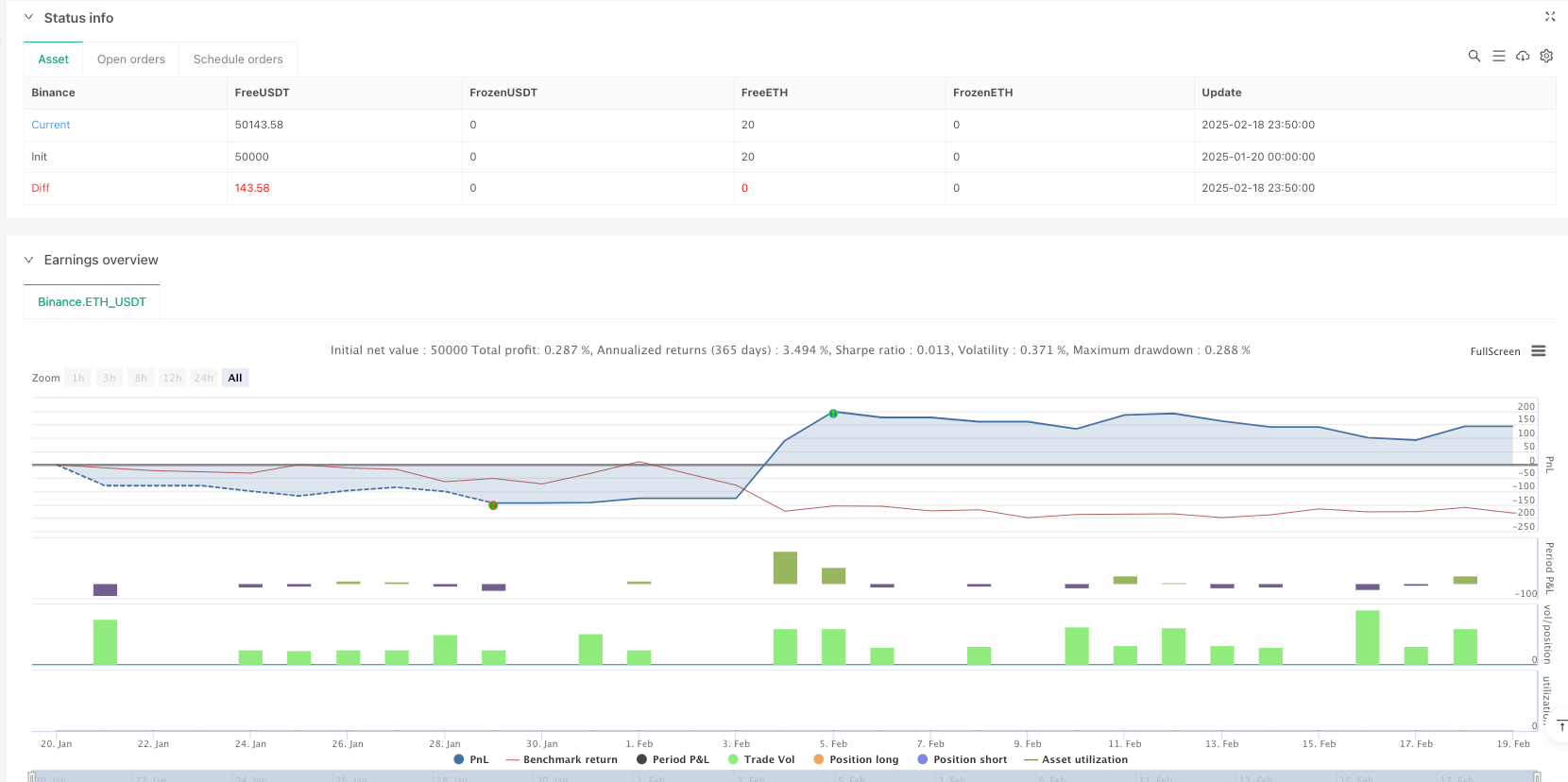

概述
该策略是一个结合波动率突破、趋势跟踪和动量确认的量化交易系统。它通过计算基于ATR的动态突破水平,并结合EMA趋势过滤和RSI动量指标来识别交易机会。策略采用严格的风险控制措施,包括固定百分比风险管理和动态止损设置。
策略原理
策略包含三个核心组成部分: 1. 波动率突破计算:使用回溯期内的最高价和最低价,结合ATR倍数计算动态突破阈值,避免前瞻偏差。 2. 趋势过滤:采用短期EMA判断当前趋势方向,只在价格位于EMA之上开多单,位于EMA之下开空单。 3. 动量确认:使用RSI指标确认市场动量,多头入场要求RSI大于50,空头入场要求RSI小于50。
策略优势
- 动态适应性:突破水平会根据市场波动率自动调整,使策略能够适应不同市场环境。
- 多重过滤:结合趋势和动量指标降低虚假信号。
- 严格风险控制:采用固定风险百分比进行头寸管理,并使用动态止损保护。
- 可定制性强:关键参数如ATR周期、突破倍数、EMA周期等都可根据具体需求调整。
策略风险
- 滞后性风险:使用移动平均等指标可能导致入场点滞后。
- 震荡市场风险:在横盘震荡市场中可能产生频繁的虚假突破信号。
- 参数敏感性:策略表现对参数设置较为敏感,需要充分测试。 解决方案:
- 建议在不同市场环境下进行回测优化
- 可以添加市场环境识别模块
- 建议采用更保守的资金管理方案
策略优化方向
- 市场环境适应:添加波动率区间判断,在不同波动环境下使用不同的参数设置。
- 信号优化:可以考虑加入成交量确认,提高突破信号的可靠性。
- 止盈止损优化:可以实现动态调整的盈亏比,根据市场波动性调整目标。
- 时间过滤:增加交易时间窗口过滤,避免在不利时段交易。
总结
这是一个结构完整、逻辑清晰的量化交易策略。通过将波动率突破、趋势跟踪和动量确认相结合,在控制风险的同时捕捉显著的价格波动。策略的可定制性强,适合进一步优化以适应不同的交易品种和市场环境。建议在实盘之前进行充分的参数优化和回测验证。
策略源码
/*backtest
start: 2025-01-20 00:00:00
end: 2025-02-19 00:00:00
period: 10m
basePeriod: 10m
exchanges: [{"eid":"Binance","currency":"ETH_USDT"}]
*/
//@version=5
// Volatility Momentum Breakout Strategy
//
// Description:
// This strategy is designed to capture significant price moves by combining a volatility breakout method
// with a momentum filter. Volatility is measured by the Average True Range (ATR), which is used to set dynamic
// breakout levels. A short‑term Exponential Moving Average (EMA) is applied as a trend filter, and the Relative
// Strength Index (RSI) is used to help avoid entries when the market is overextended.
//
// Signal Logic:
// • Long Entry: When the current close is above the highest high of the previous N bars (excluding the current bar)
// plus a multiple of ATR, provided that the price is above the short‑term EMA and the RSI is above 50.
// • Short Entry: When the current close is below the lowest low of the previous N bars (excluding the current bar)
// minus a multiple of ATR, provided that the price is below the short‑term EMA and the RSI is below 50.
//
// Risk Management:
// • Trades are sized to risk 2% of account equity.
// • A stop loss is placed at a fixed ATR multiple away from the entry price.
// • A take profit target is set to achieve a 1:2 risk‑reward ratio.
//
// Backtesting Parameters:
// • Initial Capital: $10,000
// • Commission: 0.1% per trade
// • Slippage: 1 tick per bar
//
// Disclaimer:
// Past performance is not indicative of future results. This strategy is experimental and provided solely for educational
// purposes. Always backtest and paper trade before any live deployment.
//
// Author: [Your Name]
// Date: [Date]
strategy("Volatility Momentum Breakout Strategy", overlay=true, initial_capital=10000, default_qty_type=strategy.percent_of_equity, default_qty_value=5, commission_type=strategy.commission.percent, commission_value=0.1, slippage=1)
// ─── INPUTS ─────────────────────────────────────────────────────────────
atrPeriod = input.int(14, "ATR Period", minval=1)
atrMultiplier = input.float(1.5, "ATR Multiplier for Breakout", step=0.1)
lookback = input.int(20, "Breakout Lookback Period", minval=1)
emaPeriod = input.int(50, "EMA Period", minval=1)
rsiPeriod = input.int(14, "RSI Period", minval=1)
rsiLongThresh = input.float(50, "RSI Long Threshold", step=0.1)
rsiShortThresh = input.float(50, "RSI Short Threshold", step=0.1)
// Risk management inputs:
riskPercent = input.float(2.0, "Risk Percent per Trade (%)", step=0.1) * 0.01 // 2% risk per trade
riskReward = input.float(2.0, "Risk-Reward Ratio", step=0.1) // Target profit is 2x risk
atrStopMult = input.float(1.0, "ATR Multiplier for Stop Loss", step=0.1) // Stop loss distance in ATRs
// ─── INDICATOR CALCULATIONS ───────────────────────────────────────────────
atrVal = ta.atr(atrPeriod)
emaVal = ta.ema(close, emaPeriod)
rsiVal = ta.rsi(close, rsiPeriod)
// Calculate breakout levels using the highest high and lowest low of the previous N bars,
// excluding the current bar (to avoid look-ahead bias).
highestHigh = ta.highest(high[1], lookback)
lowestLow = ta.lowest(low[1], lookback)
// Define breakout thresholds.
longBreakoutLevel = highestHigh + atrMultiplier * atrVal
shortBreakoutLevel = lowestLow - atrMultiplier * atrVal
// ─── SIGNAL LOGIC ─────────────────────────────────────────────────────────
// Long Entry: Price closes above the long breakout level,
// the close is above the EMA, and RSI > 50.
longCondition = (close > longBreakoutLevel) and (close > emaVal) and (rsiVal > rsiLongThresh)
// Short Entry: Price closes below the short breakout level,
// the close is below the EMA, and RSI < 50.
shortCondition = (close < shortBreakoutLevel) and (close < emaVal) and (rsiVal < rsiShortThresh)
if (longCondition)
strategy.entry("Long", strategy.long)
if (shortCondition)
strategy.entry("Short", strategy.short)
// ─── RISK MANAGEMENT ──────────────────────────────────────────────────────
// For each new trade, use the entry price as the basis for stop loss and target calculations.
// We assume the entry price equals the close on the bar where the trade is triggered.
var float longEntryPrice = na
var float shortEntryPrice = na
// Record entry prices when a trade is opened.
if (strategy.position_size > 0 and na(longEntryPrice))
longEntryPrice := strategy.position_avg_price
if (strategy.position_size < 0 and na(shortEntryPrice))
shortEntryPrice := strategy.position_avg_price
// Calculate stop loss and take profit levels based on ATR.
longStop = longEntryPrice - atrStopMult * atrVal
longTarget = longEntryPrice + (longEntryPrice - longStop) * riskReward
shortStop = shortEntryPrice + atrStopMult * atrVal
shortTarget= shortEntryPrice - (shortStop - shortEntryPrice) * riskReward
// Issue exit orders if a position is open.
if (strategy.position_size > 0 and not na(longEntryPrice))
strategy.exit("Long Exit", from_entry="Long", stop=longStop, limit=longTarget)
if (strategy.position_size < 0 and not na(shortEntryPrice))
strategy.exit("Short Exit", from_entry="Short", stop=shortStop, limit=shortTarget)
// Reset recorded entry prices when the position is closed.
if (strategy.position_size == 0)
longEntryPrice := na
shortEntryPrice := na
// ─── CHART VISUAL AIDS ─────────────────────────────────────────────────────
// Plot the breakout levels and EMA.
plot(longBreakoutLevel, color=color.new(color.green, 0), title="Long Breakout Level", style=plot.style_linebr)
plot(shortBreakoutLevel, color=color.new(color.red, 0), title="Short Breakout Level", style=plot.style_linebr)
plot(emaVal, color=color.blue, title="EMA")
// Optionally, shade the background: green when price is above the EMA (bullish) and red when below.
bgcolor(close > emaVal ? color.new(color.green, 90) : color.new(color.red, 90), title="Trend Background")
相关推荐